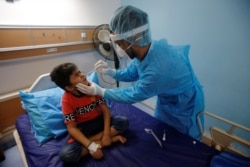Iraq’s health ministry said emergency room records show that infants died “within an hour” after being infected with the mutated COVID-19 virus, Iraqi news channel Al Sharqiya reported on February 22.
A mutated strain first identified in the United Kingdom is more dangerous and infecting age groups that the original virus did not, the ministry said.
Earlier in February, the health ministry announced that the strain, called B.1.1.7, was “fast-spreading” in Iraq, including among children.
“[T]he new variant of coronavirus is more dangerous for children and young people. In the past two days, we have recorded deaths among infants under a year old with extensive lung damage,” ministry official Haitham Al-Obeidi said.
While there is a consensus among experts that the U.K. coronavirus strain is more infectious, its actual risks for children remain under investigation.
B.1.1.7 was identified in the U.K. in October 2020. In January, experts there said it might be associated with a higher risk of death than the original virus strain, which first emerged in China. That assessment was based on clinical data presented by four leading British medical institutions: Public Health England, Imperial College London, the London School of Hygiene and Tropical Medicine and the University of Exeter.
Nervtag, the U.K.’s New and Emerging Respiratory Virus Threats Advisory Group, also reviewed the data and concluded that, compared to other variants, B.1.1.7 “appears to have substantially increased transmissibility” and “there is a realistic possibility that infection with VOC B.1.1.7 is associated with an increased risk of death.
The U.S. Centers for Disease Control and Prevention, along with the World Health Organization, also said the B.1.1.7 variant spreads more easily and could lead to “potentially more deaths.”
British scientists, including those with Nervtag, hinted as early as mid-December that the U.K. variant “has a higher propensity to infect children” and that “children are equally susceptible” as adults.
Besides Iraq, health officials in Israel also reported “concerning levels” of infection with the U.K. strain among children and young people, blaming it for “a record, unprecedented” number of people on ventilators.
“40% of illness is in children, a higher percentage than their part in the population,” Israeli Health Ministry official Sharon Alroy-Preis said in January.
“The strain causes serious symptoms at a 30 percent higher rate,” she said, adding that while getting vaccinated “works against the British mutation … the virus infection rate is much faster than the vaccine rate.”
Still, scientists warn that there is not enough data to show that children are more susceptible to the newly identified coronavirus strains.
“There is no convincing evidence that any of the variants have special propensity to infect or cause disease in children. We need to be vigilant in monitoring such shifts, but we can only speculate at this point,” said Stuart Campbell Ray, vice chair of Medicine for Data Integrity and Analytics at the Johns Hopkins Medicine.
Iraq is reportedly among the Middle East countries hardest hit by the pandemic, with 672,000 infections and 13,311 deaths as of February 23.
To curb the latest spike in infections, Iraq has reimposed a partial lockdown until March 8, instituted a nationwide mask mandate and adopted a workday curfew and total Friday-to-Sunday lockdown.






